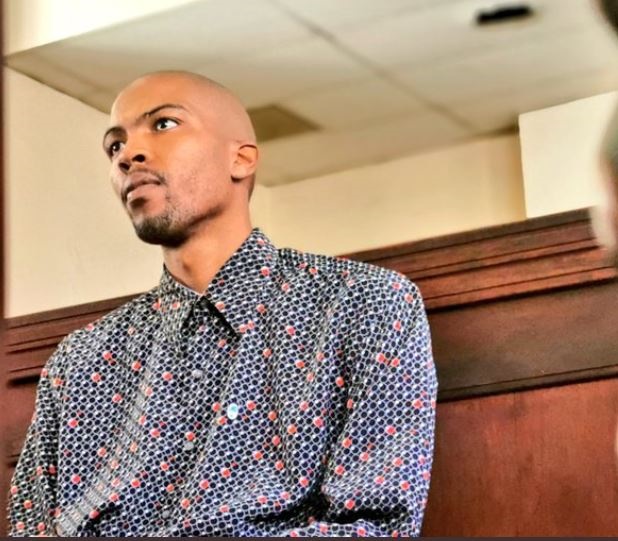
Kanya Cekeshe. Photo: PowerFM/Twitter
Multimedia · User Galleries · News in Pictures Send us your pictures · Send us your stories

Kanya Cekeshe. Photo: PowerFM/Twitter
Multimedia · User Galleries · News in Pictures Send us your pictures · Send us your stories
The NPA has been plagued by allegations of political interference, and the minister's announcement to seek a presidential pardon on behalf of Kanya Cekeshe does nothing to fight the perception of political interference, writes Phephelaphi Dube.
"The quality of mercy is not strained.
It droppeth as the gentle rain from heaven
Upon the place beneath. It is twice blessed:
It blesseth him that gives and him that takes."
So wrote William Shakespeare in The Merchant of Venice, to suggest that society is all the better for occasionally deviating from the requirement that wrongdoing should be punished.
Enter then, Kanya Cekeshe, a former student activist from the #FeesMustFall protests in 2016. He has been imprisoned since December 2017, after he was sentenced to five years behind bars for public violence and malicious damage to property. He entered a guilty plea for setting a police vehicle alight during a 2016 protest.
His latest bid for freedom failed recently when a magistrate turned down his appeal against the conviction and the appeal for him to be granted bail pending a petition to the High Court to appeal his conviction and sentence. Unless he successfully convinces the higher courts to come to a different conclusion, he seems all but set to serve the remainder of his sentence behind bars.
Enter too, Minister of Justice and Correctional Services Ronald Lamola, who in the aftermath of the appeal being denied tweeted, "We're in the process of urgently assisting him with an application for presidential pardon or other legally available avenues."
But just how do pardons work? Can the minister assist Cekeshe with applying for a presidential pardon, as the social media entry suggests?
There is no right to be pardoned. Pardons are a presidential prerogative in line with section 84(2)(j) of the Constitution which sets out the president's powers. This means that the president has a discretion in how he exercises the power to pardon or reprieve offenders. This includes the remitting of fines, penalties and any other forfeitures.
This is not to suggest that this power is unfettered. On the contrary, this power can only be exercised within the confines of the spirit and purport of the Constitution and in good faith. It must also be a rational decision, that is, a decision taken pursuant to a legitimate goal. As the Constitutional Court made clear in President of the Republic of South Africa and Others v South African Rugby Football Union and Others, the power to pardon cannot be delegated to a subordinate – it is a power that the president alone can exercise.
While there is no legal framework to guide how the president may exercise this discretion to pardon, the public interest should be a guiding factor in the decision. Pardons may be used to correct mistaken convictions or reduce excessive sentences. A pardon may be used further to confer mercy upon individuals or groups of convicted prisoners when the president thinks it will be in the public interest. This would require the president to consider the nature of the offense as well as the rights of the victims of any such offense.
As such, the president must weigh all of the relevant information regarding Cekeshe's offence. This includes the fact that the demand for free higher education is a legitimate protest cause and the fact that the right to protest is constitutionally enshrined. This must be considered alongside the offense of which he is convicted; public violence and malicious injury to property.
The public interest would also require that any victims of Cekeshe's offenses be heard in the decision to grant a presidential pardon. Such a victim would likely be the South African Police Services, seeing as it is their property admittedly set alight.
What becomes apparent though is that the power to pardon Cekeshe does not rest with Minister Lamola, but rather with the president, however well-intentioned the minister's remarks on social media may be. In any event, Cekeshe has not exhausted the available legal remedies. He may still petition higher courts, all the way to the Constitutional Court, after which there will be finality on his sentence.
Thus, having exhausted all available legal remedies, he may apply for a presidential pardon. Of concern though is Lamola seemingly seeking to interfere in the processes of the National Prosecuting Authority (NPA). The NPA has in recent years been plagued by allegations of political interference, and this announcement by the minister does nothing to fight the perception of an attempt at political interference.
Nonetheless, a presidential pardon, or mercy, is an integral element in the criminal justice system. Lamola, however, need not bypass existing structures nor force the president's hand for this to happen.
- Dube is an independent legal consultant.
Disclaimer: News24 encourages freedom of speech and the expression of diverse views. The views of columnists published on News24 are therefore their own and do not necessarily represent the views of News24.